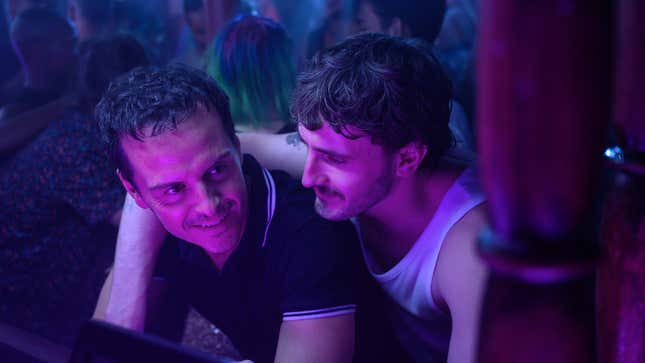
At a certain point in the middle of Andrew Haigh’s gentlest of psychodramas, All of Us Strangers, I thought to myself, “Is there anything this movie can’t do?” It had already introduced me to the ghosts (of sorts) of the parents of protagonist Adam (Fleabag’s Andrew Scott), reminded me of the greatness of Frankie Goes to Hollywood (the synthpop group’s 1984 “The Power of Love” provides a motif), and shown me one of the most erotic blowjob sequences I’ve ever seen in a mainstream movie (it’s Paul Mescal as Harry doing the servicing, and it manages to be explicit without being revealing). And then, it hit me with a club scene that nails the dissociative properties of ketamine, features a backlit makeout session between Adam and Harry (beams of light jut through their open mouths), uses Blur’s 1997 song “Death of a Party,” and ends in a scream.
I was completely amazed, and then some 10 minutes later, I cried watching Adam and his parents (played by Claire Foy and Jamie Bell) decorate the Christmas tree while singing along to the Pet Shop Boys’ cover of “Always on My Mind,” a song I love but find almost as hard to listen to as the sun is to look at. It’s just that sad. Neil Tennant’s mourning voice cuts through the hi-NRG disco arrangement, jubilance shading in the sadness. I felt like the movie was speaking directly to me.
All of Us Strangers, which will play at New York Film Festival and open in theaters in December, was such a profoundly moving experience that I find it impossible to write about with detached objectivity. After all, the movie is about nothing as much as it is about subjectivity. Repeatedly, we watch Adam taking in scenery and then cut to the camera tracing where his eyes just hit. The story largely takes place in its protagonist’s head—he’s a writer in contemporary London, working on a screenplay set in 1987. (The screenplay, which Haigh wrote, is loosely based on the 1987 novel Strangers by Taichi Yamada.) As Adam writes, he travels back to the home where he was raised to visit with his parents, whom we find out died in a car accident when he was 12. They receive him as a middle-aged man—as a result, son and parents are basically the same age—and a series of conversations takes place about Adam’s life, including his sexuality; like many of Haigh’s protagonists and Haigh himself, Adam is gay. Through this device, Haigh shows the writing process in addition to his character’s internal journey, two of the hardest things to capture on film in any way that doesn’t bore viewers to death. That they live and breathe here is a feat in itself. The framework also makes All of Us Strangers a fantasy in the purest sense of the word, regardless of the dragons and magic that have become synonymous with the genre.
Adam’s parents’ absence from his life for more than 30 years allows for a series of naturalistic conversations that might have seemed overly expository (and clunky) in another context. He comes out to his mother, who frets about the “very lonely life” he faces (a cliché of begrudging queer allies in the ‘80s), and blows her mind when he tells her that HIV is no longer a certain death sentence. In a separate conversation with his father, the news of his sexuality is met as no surprise as, according to his dad, he “couldn’t throw a ball for shit.” Adam recounts being bullied at school and his father says, rather glibly, that he would have mocked a pre-gay classmate too. A few beats later, he’s apologizing for not ever going into his son’s room when he heard his post-bullying sobs. Because this is all being constructed from Adam’s point of view, not a moment seems anything less than crucial to his processing of unresolved grief. This is a movie that savors.
Adam’s relationship with Harry is less fraught. They do have some generational differences (Scott is 46 and Mescal is 27, and we’re to gather that their characters are roughly the same age). Harry identifies as queer, a word that Adam finds loaded. Harry feels similarly about Adam’s chosen label of “gay,” which Harry grew up hearing as a synonymous label for the bad and stupid. But the relationship is a refuge, a home away from the home in Adam’s head. It’s a source of unconditional love beyond that which he feels coming with reservations from his parents. It makes the past suffering worth it. It’s, in many ways, a prototypical healing gay relationship. Haigh takes a risk by repeating a lot of the topes we’ve witnessed to death in gay stories, but the holistic picture he paints about pain and healing is a fresh structure. It speaks to the universality of some experiences—gay canon events, if you will—among the highly varied lives that we all live.
After Adam’s trip to the club, the timeline of All of Us Strangers becomes hazier. Dreams form within dreams and internal logic buckles. This is all by design. Adam’s reality becomes increasingly fractured as he hurtles toward the resolution he needs with his parents. His ending is simultaneously tragic and joyful. It reminded me of a line from Pulp’s song “Monday Morning”: “Why live in the world when you can live in your head?” I always thought that was a good point.